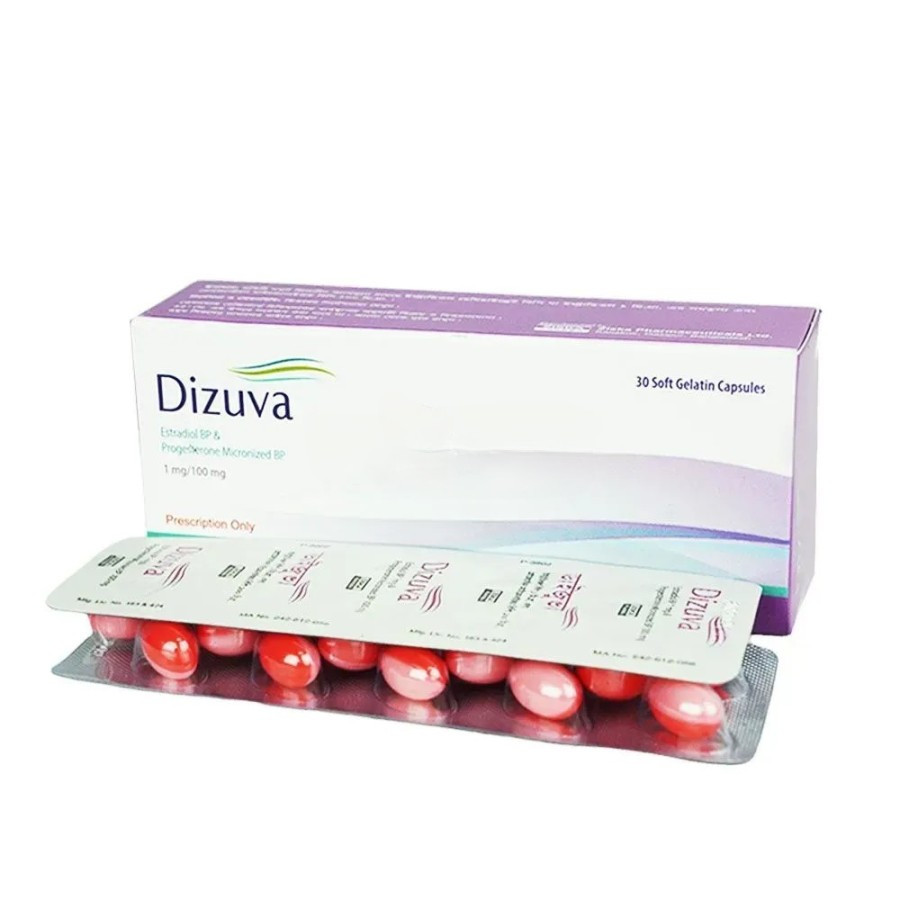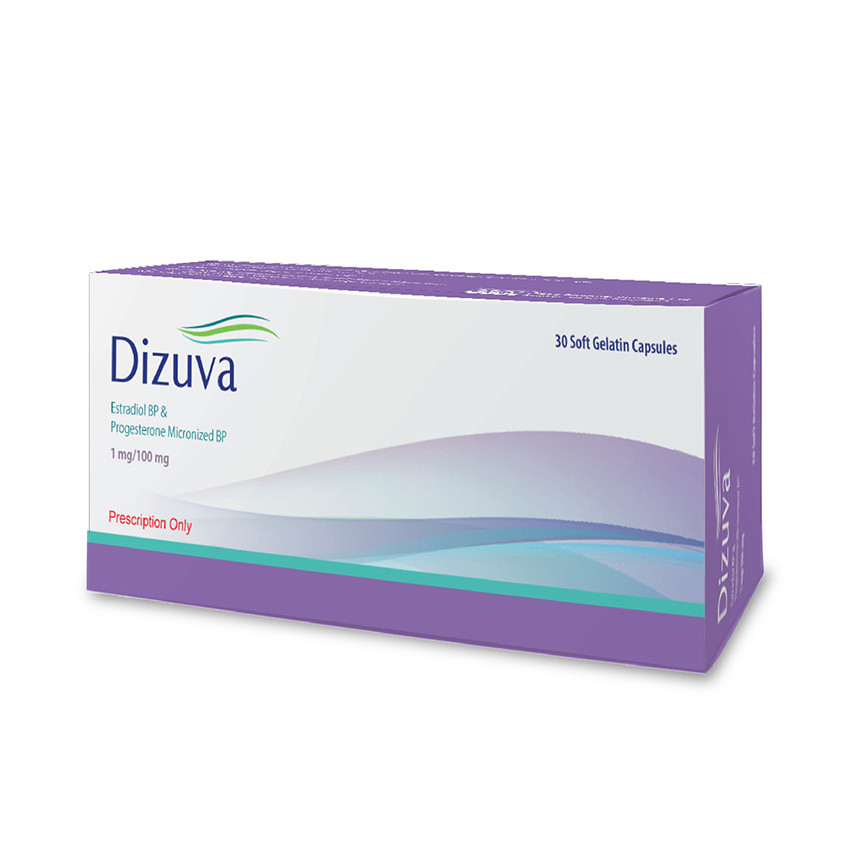Dizuva Capsule
Pack Images
1 mg+100 mg
Unit Price:
৳ 22.00
(3 x 10: ৳ 660.00)
Strip Price:
৳ 220.00
Indications
Dizuva capsule is indicated for use during continuous combined Hormone Replacement Therapy (HRT) for estrogen deficiency symptoms in postmenopausal women with an intact uterus and with at least 12 months since last menses.
Composition
Each soft gelatin capsule contains
- Estradiol Hemihydrate BP equivalent to Estradiol 1 mg &
- Progesterone Micronized BP 100 mg
Pharmacology
Endogenous estrogens are largely responsible for the development and maintenance of the female reproductive system and secondary sexual characteristics. Estrogens act through binding to nuclear receptors in estrogen-responsive tissues. The production of estradiol by the ovaries is under the control of pituitary gonadotropins, Follicle Stimulating Hormone (FSH) and Luteinizing Hormone (LH). Circulating estrogens modulate LH and FSH, through a negative feedback mechanism. In menopausal women, the depletion of ovarian follicles leads to lower plasma estradiol and elevated plasma FSH and LH. The addition of progesterone opposes the development of endometrial hyperplasia
Dosage & Administration
Adult: Take a single capsule orally each evening with food.
Pediatrics: This capsule has not been studied in this patient population and is not recommended for use.
Geriatrics: This capsule has not been studied in this patient population and is not recommended for use.
Hepatic Insufficiency: This capsule is contraindicated in women with liver dysfunction or disease as long as liver function tests have failed to return to normal.
Renal Insufficiency: This capsule is to be used with caution in women with renal dysfunction.
Pediatrics: This capsule has not been studied in this patient population and is not recommended for use.
Geriatrics: This capsule has not been studied in this patient population and is not recommended for use.
Hepatic Insufficiency: This capsule is contraindicated in women with liver dysfunction or disease as long as liver function tests have failed to return to normal.
Renal Insufficiency: This capsule is to be used with caution in women with renal dysfunction.
Interaction
With Medicine: No drug-drug interaction studies have been conducted with Dizuva.
With Food and Others: The exposure of Dizuva can be affected by food intake. Inhibitors of CYP 3A4 such as grapefruit juice may increase plasma concentrations of estrogens and may result in side effects
With Food and Others: The exposure of Dizuva can be affected by food intake. Inhibitors of CYP 3A4 such as grapefruit juice may increase plasma concentrations of estrogens and may result in side effects
Contraindications
Hypersensitivity to this drug or to any ingredient in the formulation, including any non-medicinal ingredient or component of the container, patients with liver dysfunction or disease where liver function tests have failed to return to normal, history of estrogen-dependent or progestogen dependent malignant neoplasia, patients with endometrial hyperplasia, undiagnosed abnormal genital bleeding, pregnancy, breastfeeding, history of arterial thromboembolic disease, patients with classical migraine
Side Effects
Common: Alopecia, nausea, abdominal pain, headache, fatigue, flatulence, dizziness, vaginal hemorrhage, vaginal discharge, uterine spasm, pelvic pain and breast pain.
Rare: Ear swelling, vertigo, hirsutism, dry eye, vision blurred, visual impairment, vitreous floaters, cholelithiasis, unstable angina.
Rare: Ear swelling, vertigo, hirsutism, dry eye, vision blurred, visual impairment, vitreous floaters, cholelithiasis, unstable angina.
Pregnancy & Lactation
This is not recommended during pregnancy, labor or delivery and in mothers who are breast feeding.
Precautions & Warnings
Women using HRT sometimes experience increased blood pressure. Blood pressure should be monitored with HRT use. Elevation of blood pressure in previously normotensive or hypertensive patients should be investigated and HRT may have to be discontinued. Estrogens with or without progestins may cause fluid retention. Therefore, particular caution is indicated in cardiac or renal dysfunction or asthma.
Patients who develop visual disturbances, classical migraine, transient aphasia, paralysis or loss of consciousness should discontinue medication.
Patients who develop visual disturbances, classical migraine, transient aphasia, paralysis or loss of consciousness should discontinue medication.
Overdose Effects
Overdosage with Dizuva capsule may be expressed by feeling sick, breast discomfort, fluid retention, bloating and vaginal bleeding. Other signs may include feeling sad, tiredness, acne and excess hair growth.
Therapeutic Class
Drugs for menopausal symptoms: Hormone replacement therapy, Female Sex hormones
Storage Conditions
Do not store above 25°C. Protect from light. Keep out of the reach of children.
Pack Images: Dizuva 1 mg Capsule



